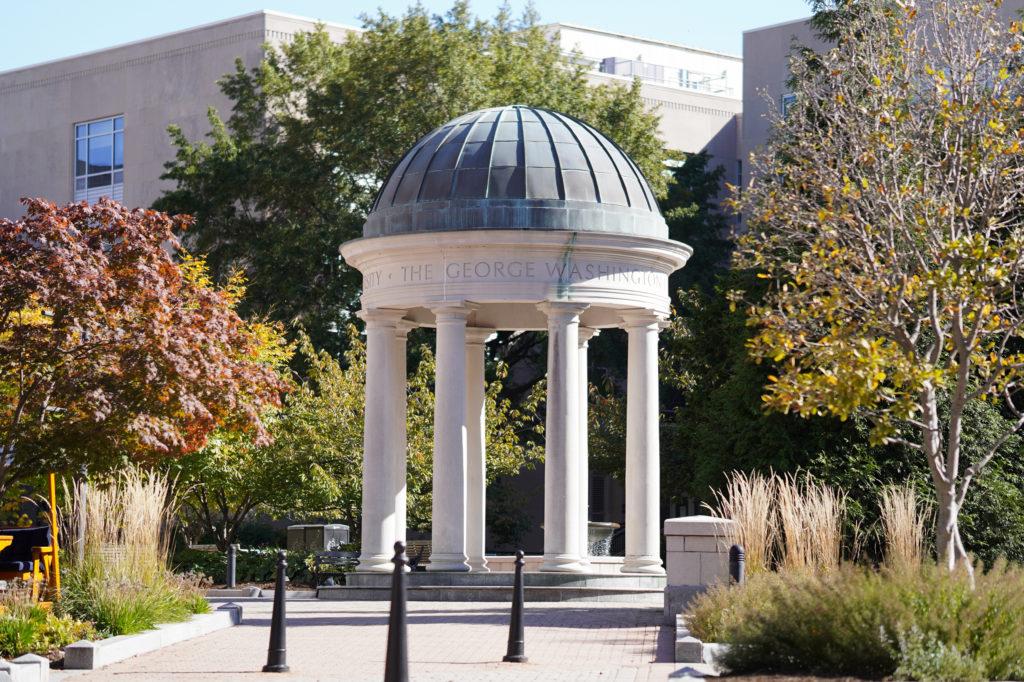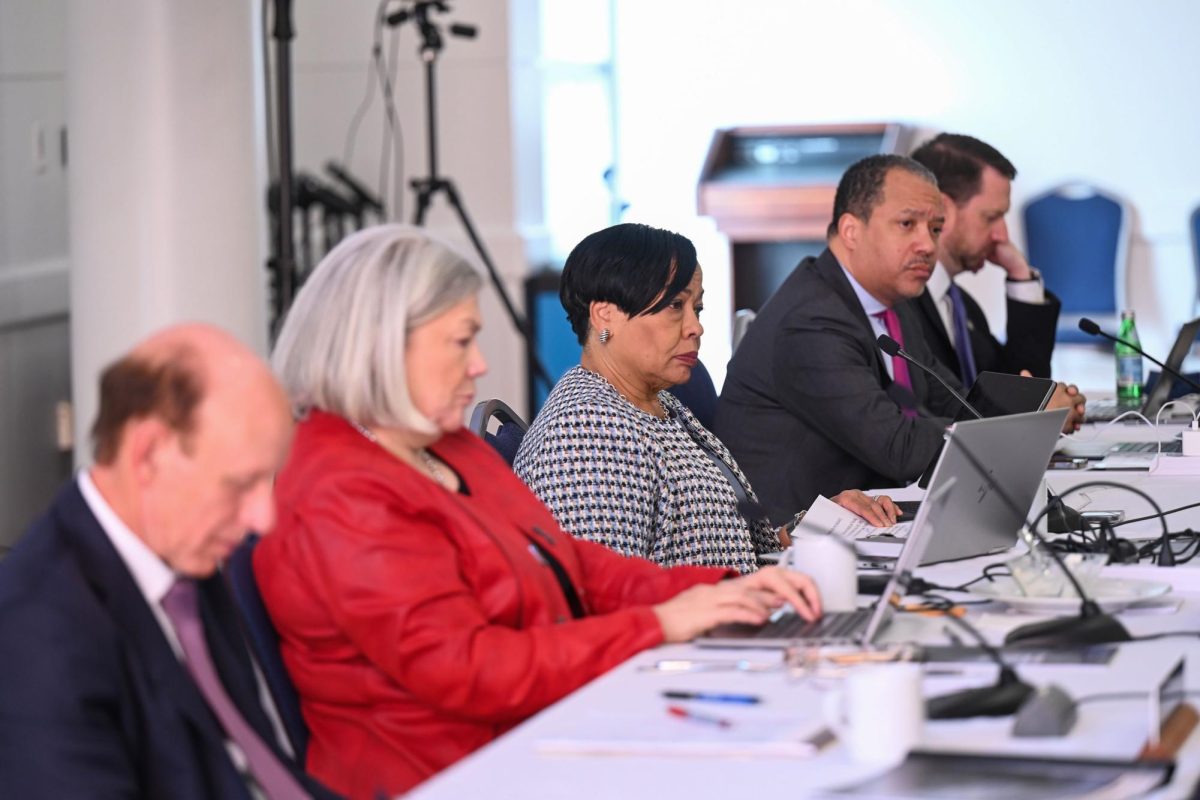GW may struggle to find qualified candidates to serve as the University’s next permanent leader as its presidential search nears its six-month mark, experts said.
When Board of Trustees Chair Grace Speights announced that GW would have an interim president last September, she said officials were facing a shortage of qualified candidates to replace former University President Thomas LeBlanc in a permanent capacity. Experts in higher education and administration searches said the higher education industry is still seeing dozens of presidential and administrative openings, making it difficult for even the most prestigious institutions – like Ivy League and other large urban universities – to recruit qualified presidential candidates.
Speights said in September that officials were “concerned” about finding a talented candidate for LeBlanc’s permanent replacement because of the number of presidential searches ongoing at universities nationwide and that GW would have to improve shared governance and collaborative planning to find a qualified long-term leader.
“We also felt that the University needed to be in the strongest possible position to attract the best talent,” Speights said in an email to community members last September.
University spokesperson Tim Pierce said the presidential search committee has received more than 150 nominations from faculty, staff, students and alumni since it formed at the end of the last academic year.
“Because of the competitive market for high-quality presidential candidates, the search committee is charged with being innovative and flexible in finding and attracting outstanding talent,” he said in an email. “While the committee is mindful of the highly competitive market for talent, owing to the very unusual number of open presidential searches at the nation’s best universities, the committee remains optimistic that GW is an extremely attractive presidency and will be able to recruit a strong cadre of individuals for their consideration.”
Pierce said the committee plans to release its presidential profile – which outlines the qualifications, background and type of strategic goals that the University is looking for candidates to meet – next month, meaning the profile process took about three months longer than it did in GW’s last presidential search.
“The appointment of President Mark Wrighton, a world class scholar with a record of exceptionally successful leadership at MIT and at Washington University has strengthened GW’s position by signaling that high quality individuals are attracted to GW’s unique strengths and opportunities,” he said.
Experts in higher education said there has been a high level of turnover in higher education leadership, and some of the country’s top institutions are either searching for or recently recruited new leaders before GW made progress on its search.
John R. Broderick, who served as the president of Old Dominion University in Virginia from 2008 to 2021, said many university presidents and leaders around the country have left their posts during the last few years, partially because of the increased stress and workload from the COVID-19 pandemic. He said there are at least half a dozen presidential vacancies in the Boston metropolitan area alone, including at Harvard University and Emerson College.
“I do think the COVID crisis that all of us did deal with for the better part of 18 months to a couple of years really took a toll on people,” he said. “I mean these jobs are pretty time-consuming and then require a great deal of energy to begin with.”
Broderick said a presidential search can take as long as a full calendar year from when a University president leaves to trustees approving a replacement, but institutions also have to move quickly to recruit potential candidates because of the competition from other universities.
“I’m sure they’re going to use their due diligence in terms of the decision making, and I imagine the search consultant and others are reminding people that this is a competitive time to attract qualified candidates, and George Washington doesn’t want to be the last one out of the block,” he said.
GW hired California-based education search firm Education Executives – which was involved in presidential searches at both the University of Miami, Johns Hopkins University, the Massachusetts Institute of Technology and Rice University – in June to help officials find and recruit potential candidates.
Education Executives officials have posted an advertisement and email address to start communicating with potential candidates for GW’s top job, but officials have not publicly released their presidential profile, which helps candidates figure out whether they should apply. In GW’s last presidential search, officials released their presidential profile about five months into the search process and less than three months before they announced LeBlanc would come into office.
Alumnus Shane Hammond, a senior lecturer for the department of educational policy, research and administration at the University of Massachusetts Amherst, said even before the COVID-19 pandemic a large bulk of higher education leadership were members of the aging baby boomer generation, 40 percent of whom were already retiring in 2020, meaning the industry would have to shift to a smaller and younger class of leadership in the next few years anyways.
Hammond said he would expect the search committee to begin formal interviews of vetted candidates in the coming months, and that an official job description should already be posted.
“It’s likely that they might vet the candidates and then provide a list of maybe half a dozen people that might be worth talking to that meet the criteria,” he said.
Judith Solano, the director emerita of the University of North Florida School of Computing who served on UNF’s 1998 presidential search committee and the Florida public university system’s 2008 chancellor search committee, said she would expect trustees to be able to announce their final presidential candidate by its meeting in February, based on the start date of the presidential search in April.
She said presidential search committees need to move quickly to secure qualified candidates, especially considering the number of active higher education searches in the country right now, and officials should be prepared to lock down their final choice within the next few months.
“I would expect them to use this fall time period and January to go through the applications, whittle them down, invite people to campus, have the interviews and collect information,” she said. “And I would suspect that they would want to be in a position to make the announcement at their February meeting.”
Solano said it has become more common for universities to appoint interim presidents if their top leader leaves after a tumultuous period or to provide more time for a thorough search, especially if they think it will be difficult to attract a large pool of qualified candidates.
Solano said presidential search firms, like Education Executives, can sometimes slow down or limit the progress of presidential and leadership searches because of the amount of time it takes for them to “pre-screen” a candidate’s credentials before they make their way to officials, which can sometimes slow down the search process.
“We do have search committees who get to define the job descriptions, but then they don’t really get to see the candidates until they’re already kind of pre-screened and in the past, we were the ones who did the screening.








